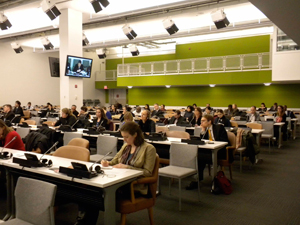World Interfaith Harmony Week
In October of 2010, the United Nations General Assembly adopted a resolution to mark World Interfaith Harmony Week dannually during February 1-7. In honor of this week, on February 3, 2011, Qamar-ul Huda presented his work on a panel entitled "The Role of faith-based organizations and interfaith initiatives in Development, Reconciliation and Peacebuilding” sponsored by the Organization of Islamic Conference (OIC).
February 10, 2011
 In October of 2010, the United Nations General Assembly adopted a resolution to mark World Interfaith Harmony Week dannually during February 1-7. The interfaith harmony week stresses the need to advance mutual understanding and interreligious dialogue as a way to promote harmony between all people. With conferences, workshops, seminars, and lectures on every continent, various U.N. agencies are cooperating to discuss effective strategic dialogues to foster mutual understanding among faiths, cultures and the work of the U.N.
In October of 2010, the United Nations General Assembly adopted a resolution to mark World Interfaith Harmony Week dannually during February 1-7. The interfaith harmony week stresses the need to advance mutual understanding and interreligious dialogue as a way to promote harmony between all people. With conferences, workshops, seminars, and lectures on every continent, various U.N. agencies are cooperating to discuss effective strategic dialogues to foster mutual understanding among faiths, cultures and the work of the U.N.
On February 3, 2011 Qamar-ul Huda, senior program officer in the Religion and Peacemaking Center of Innovation and editor of "Crescent and Dove," presented his work on a panel entitled "The Role of faith-based organizations and interfaith initiatives in Development, Reconciliation and Peacebuilding” sponsored by the Organization of Islamic Conference (OIC). Huda spoke about the ways in which Muslim religious leaders are working in the areas of conflict prevention, mediation, and conflict transformation. Huda said religious leaders and religious organizations involved in peacemaking are operating from their respective faith traditions to support personal, communal, and relational transformations. Some of these peacemaking efforts include recognition of pain, counseling to victims, rehabilitation, supporting conflict victims from from trauma, using public confessions to heal, joint interfaith prayers, using narratives to create empathy, creating advocacy programs for victims, using innovative platforms to explain misunderstandings, addressing the distorted image of the other in the faith tradition, and using the arts to express mutual respect.



